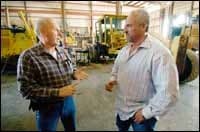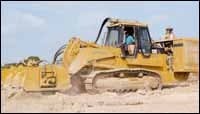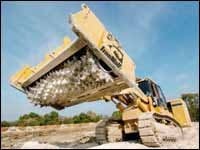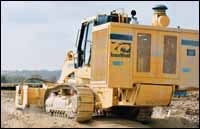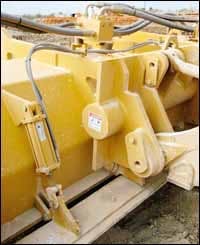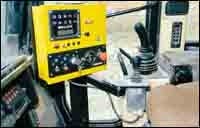Mounted on a Caterpillar 973C crawler loader, the Rodman Companies' IronWolf Crusher makes a second pass across an excavation at one of the company's Dallas jobsites.
A stalk-mounted, color-coded pressure gauge, top, tells the operator whether the IronWolf Crusher is running at optimum pressure. The speed of the host machine can be adjusted to keep pressure in the "green" zone. An in-cab panel, above, provides control and monitoring functions for the hydraulic power pack.
The work lives of Rod Vilhauer and Larry Beller have taken considerably different paths. But the two men are much alike in one respect: both are smart, tenacious entrepreneurs.
Vilhauer and partner Barry Rich started a small excavating firm 15 years ago in Dallas, Texas. Today, that enterprise, known as the Rodman Companies, has 1,400 employees, 600 pieces of mobile equipment, 130 heavy trucks and four concrete batch plants—all engaged in turnkey site development. Everything from the silt fence, to excavation, to wet utilities and paved streets, says Vilhauer.
By contrast, Beller, an Oklahoma native and an inventor at heart, moved to Alaska in the 1970s to work on the oil pipeline, not to return until 1997. Along the way, he developed an amphibious dredge, a snow-melting system, and a machine that could competently excavate the frozen, brick-hard soil of Alaska, known as permafrost. This latter invention resulted from Beller's annoyance at the ineffective way conventional equipment performed when excavating permafrost to establish roads into new drilling sites.
It was, in fact, the permafrost excavator, now known as the IronWolf Crusher, that brought the interests of Vilhauer and Beller together last October on a 95 F day in Dallas. You might reasonably ask why Vilhauer, who has crews working in blistering Texas heat most of time, would be interested in a machine designed to work comfortably in frozen soil at minus 40 F? The answer is rock.
Rock, mostly limestone, which can lie in thick slabs across many of the Rodman Companies' jobsites, is a constant vexation for its excavating crews. On a current job, for example, the company must move 370,000 cubic yards of rock—with cuts as deep as 17 feet—as crews excavate utility trenches and building pads for a new high school.
Since blasting is out of the question on most jobsites, says Vilhauer, the company has experimented with all sorts of rock-cutting systems, but has essentially settled on using big crawler dozers with rippers as the best of alternatives. But this method is a compromise, he says, because it's exceedingly slow and tears up expensive tractors.
"Seldom is the rock in a formation where you can 'flake' it—pull it out in small pieces," he says. "Most formations have ledges, and usually you pull up big slabs that must be popped with the ripper just to get them down to a size that the tractor can climb over. Now you have an $800,000 machine twisting and turning all day on the rock trying to break it. And if you happen to be over soft material, you just push the rock farther down."
In the past, says Vilhauer, the chunks of limestone left by the dozers were hauled away and replaced by a uniformly graded material known as select fill. But the select-fill resource is about gone, he says, and as a consequence, some specifications now allow on-site limestone to be used as fill. The catch, though, is that the material typically must be processed down to at least 4-inch-minus before it's acceptable.
"You can put a D10 out there, or even a D11, and then spend day after day trying to process this material—walk it down," he says. "These are rock tractors, but look at the wear and tear on undercarriages—and on the clutches and finals. The cost of processing rock with a D10 is $3.50 to $4.00 per yard. The alternative is to use a portable crusher, which takes three days to set up and further adds to the cost."
Obviously, given the problems of excavating rock, Vilhauer and Rich always have been willing to try different techniques that offered to make the process less arduous and less costly. But still, when David Griffis, the marketing representative for Construction Technologies Inc., the manufacturer of the IronWolf Crusher, called on the company, the contractors were skeptical.
"I had my doubts that the machine
